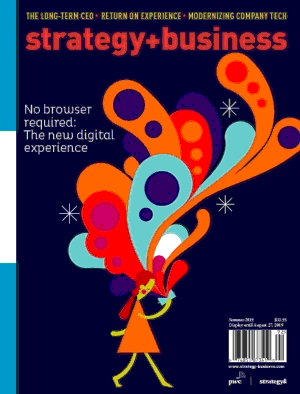Issue 95, Summer 2019

Cover story
- To thrive in a world of apps, platforms, and privacy concerns, marketers have to become multitaskers.
- GMO
Succeeding the long-serving legend in the corner office, with video
According to the 19th annual CEO Success study by PwC’s Strategy&, boards and new CEOs can reduce the risk associated with handing off the baton after a long tenure. - GMO
10 principles for modernizing your company’s technology, with infographic
Today’s technology platforms are not just new versions of legacy systems. They allow you to design a completely new digital enterprise — as long as you follow these guidelines. See also “A Guide to Modernizing Your Company’s Technology.” - Global Perspective
Facing up to a four-generation society
A practical discussion of how we might turn a massive social liability into a common good. Leadership lessons from Game of Thrones
Paying attention to your values and persuasion style can help you avoid getting beheaded or stabbed to death.
Leading Ideas
- Tech & innovation
Ears wide open
Voice-activated technology and devices are creating new media, entertainment, and marketing businesses built on the age-old power of simply listening. - Tech & innovation
The kidtech is all right
Dylan Collins, CEO of SuperAwesome, describes how his six-year-old company is hitting a growth spurt by leading the charge on digital privacy for children. - Consumer & retail
ROX: How to get started with the new experience metric
Make sure you understand “return on experience” — the new way of tracking the results of your investments in customer and employee experiences — and how to implement it. - Tech & innovation
Team Human vs. Team AI
To make artificial intelligence live up to its promise, we need to understand and reframe the values implicit in the technology.
Essays
- Leadership
The confidence premium
In PwC’s annual global survey of chief executives, CEOs’ optimism about their own company’s prospects is a leading indicator of broader economic prosperity. How, then, can we best foster confident CEOs? - Leadership
Masters of the middle-market universe
The midsized companies in the U.S. that grow the fastest understand their strong suits and play their hands accordingly.
Books in Brief
- Business books
Finding your company’s cultural sweet spot
In her new book, psychology professor Michele Gelfand explains some of the differences between social groups, and the conflicts that erupt among them. - Business books
Can capitalism be fixed?
In his new book, The Future of Capitalism, Oxford economist Paul Collier lays out a path to restore the ethical foundations of the free-market system in the U.S. and Europe. - Business books
Machine learned
In his new book, Globotics Upheaval, economist Richard Baldwin wrestles with the opportunities and perils brought about by globalization and robotics. - Business books
The case for general excellence
In his new book, Range, David Epstein argues that although specialization has its virtues, businesses need people with wide horizons and ranges of interests in order to succeed.
The Thought Leader Interview
Mission critical
Economist Mariana Mazzucato explains how solving society’s toughest problems starts with rethinking how value is created and innovation is incentivized.
Recent Research
- s+b Blogs
The hidden perils of temp turnover
In the gig economy, more companies are employing temporary workers for greater flexibility. But that strategy comes at a cost.
Trending articles
- 1.Power moves
Energy economics expert Michael Pollitt explains why the most muscular solutions to the world’s energy transition are global.
- 2.Leap to leader: Make yourself heard
In his new book, Adam Bryant shares tactics that up-and-coming leaders can use to prove they are ready for the next challenge.
- 3.Eat Your Peas: A Recipe for Culture ChangeThe methods used by celebrity chef Jamie Oliver to promote health in a West Virginia city can also be used to raise organizational performance.
- 4.Rethinking total reward strategiesPay, incentives, and benefits haven’t significantly changed for decades, but people’s preferences have. Employee compensation needs a rethink if companies are to attract and retain talent.
- 5.Resilience is a skill that’s just as important as tech know-how
Amid significant changes to how people work and live, the ability to persevere is critical.























